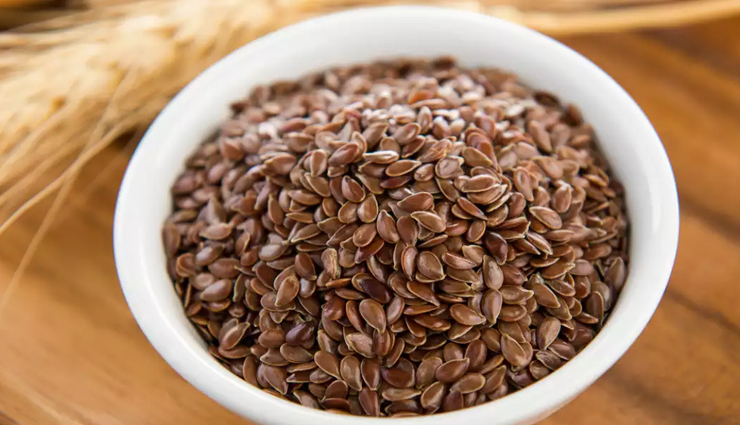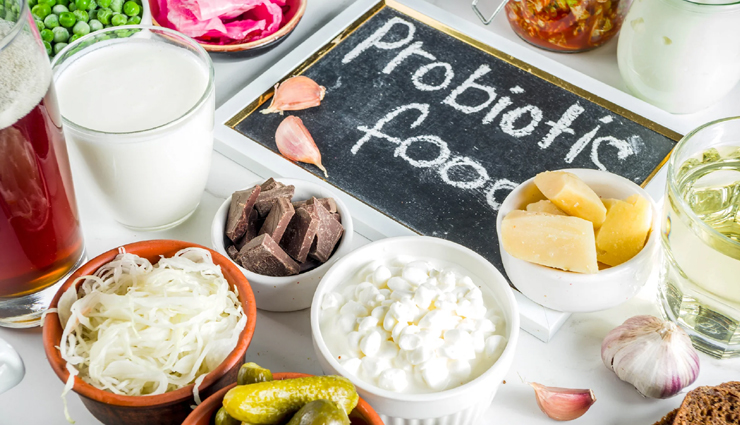- Home›
- Healthy Living›
- 9 Effective Home Remedies To Relieve Constipation Naturally
9 Effective Home Remedies To Relieve Constipation Naturally
By: Pinki Sat, 20 May 2023 10:36:14

Constipation is a common digestive disorder characterized by infrequent bowel movements or difficulty passing stools. It occurs when the movement of stool through the intestines slows down, leading to hard, dry, and compacted stools. This can result in discomfort, bloating, and a feeling of incomplete evacuation.
Some common causes of constipation include a lack of dietary fiber, inadequate fluid intake, a sedentary lifestyle, certain medications, hormonal changes, and underlying medical conditions. Lifestyle factors such as a low-fiber diet, insufficient physical activity, and ignoring the urge to have a bowel movement can also contribute to constipation.
The symptoms of constipation may vary from person to person but often include:
Infrequent bowel movements (less than three times a week)
Difficulty passing stools
Straining during bowel movements
Feeling of incomplete evacuation
Hard or lumpy stools
Abdominal bloating or discomfort
Rectal pain or pressure
Decreased appetite
Fortunately, constipation is usually temporary and can often be relieved through simple lifestyle changes and home remedies. In this article, we'll explore ten effective home remedies that can help alleviate constipation and promote healthy bowel movements.

# Increase Fiber Intake
Increasing fiber intake is indeed an effective approach to relieve and prevent constipation. Dietary fiber adds bulk to the stool, promotes regular bowel movements, and helps soften the stool, making it easier to pass. Here are some tips on how to increase fiber intake to alleviate constipation:
Consume More Fruits and Vegetables: Include a variety of fruits and vegetables in your diet, as they are excellent sources of fiber. Opt for options like berries, apples, pears, oranges, broccoli, Brussels sprouts, carrots, and leafy greens.
Choose Whole Grains: Replace refined grains with whole grain options such as whole wheat bread, brown rice, quinoa, oats, and whole grain cereals. These contain higher fiber content and provide more nutrients.
Include Legumes and Beans: Legumes and beans, such as lentils, chickpeas, black beans, and kidney beans, are rich sources of fiber and can be added to soups, salads, stews, or as a side dish.
Incorporate Nuts and Seeds: Snack on nuts like almonds, walnuts, and seeds like chia, flax, and pumpkin seeds, as they provide both fiber and healthy fats.
Consume High-Fiber Snacks: Replace processed snacks with high-fiber alternatives like air-popped popcorn, fresh fruit, raw vegetables with hummus, or homemade trail mix with nuts and dried fruits.
Opt for Whole Fruits Instead of Juice: Choose whole fruits over fruit juices as they retain their natural fiber content, which helps regulate bowel movements.
Include Bran in Your Diet: Wheat bran, oat bran, or rice bran are concentrated sources of fiber that can be added to smoothies, cereals, or baked goods to boost your fiber intake.
Gradually Increase Fiber Intake: Increase fiber intake gradually to allow your digestive system to adjust. Sudden significant changes may cause discomfort or bloating.
Consider Fiber Supplements: If it's challenging to meet your daily fiber requirements through diet alone, fiber supplements like psyllium husk or methylcellulose can be taken under the guidance of a healthcare professional.

# Stay Hydrated
Staying hydrated is indeed crucial for preventing and relieving constipation. An adequate fluid intake helps soften the stool, adds bulk, and facilitates smooth bowel movements. Here are some tips to stay hydrated and promote regularity:
Drink Plenty of Water: Aim to drink at least 8 glasses (64 ounces) of water per day. Carry a water bottle with you to ensure you have access to water throughout the day.
Include Hydrating Foods: Consume foods with high water content, such as cucumbers, watermelon, oranges, grapes, tomatoes, and soups. These foods not only provide hydration but also contribute to your overall fiber intake.
Limit Caffeine and Alcohol: Beverages like coffee, tea, and alcoholic drinks can have a diuretic effect, causing increased fluid loss. While they can contribute to overall fluid intake, it's important to balance them with plain water or other hydrating options.
Infuse Water with Flavors: If you find plain water boring, add natural flavors like slices of citrus fruits, berries, or herbs like mint or basil to enhance the taste. This can make drinking water more enjoyable and encourage higher consumption.
Set Hydration Reminders: Use phone alarms or apps to remind yourself to drink water at regular intervals throughout the day. This can help establish a routine and ensure you stay adequately hydrated.
Carry a Water Bottle: Having a reusable water bottle with you makes it convenient to sip water wherever you go, whether you're at work, running errands, or exercising.
Drink Before Meals: Have a glass of water 30 minutes before each meal. This not only aids hydration but can also help promote proper digestion and bowel movements.
Monitor Urine Color: Pay attention to the color of your urine. Clear or light yellow urine indicates proper hydration, while dark yellow or amber-colored urine suggests dehydration. Aim for pale yellow urine as a general guideline.

# Exercise Regularly
Exercise regularly can indeed help alleviate constipation by stimulating bowel movements and promoting healthy digestion. Physical activity helps activate the muscles in the intestines, encouraging the passage of stool. Here are some tips on how to incorporate exercise into your routine to relieve constipation:
Engage in Aerobic Exercises: Activities like brisk walking, jogging, cycling, swimming, or aerobic classes can help stimulate the muscles in your digestive system and promote regular bowel movements. Aim for at least 30 minutes of moderate-intensity aerobic exercise most days of the week.
Try Yoga or Pilates: Certain yoga poses and Pilates exercises can specifically target the digestive system and help alleviate constipation. Poses like Pawanmuktasana (Wind-Relieving Pose), Malasana (Garland Pose), and Balasana (Child's Pose) can be beneficial. Look for yoga or Pilates routines that focus on improving digestion.
Include Abdominal Exercises: Strengthening the abdominal muscles can support healthy digestion and bowel movements. Exercises like abdominal crunches, planks, and leg raises can help activate these muscles. Consult with a fitness professional to learn proper technique and suitable exercises.
Stay Active Throughout the Day: In addition to structured exercise sessions, aim to stay active throughout the day. Take breaks from sitting for prolonged periods and incorporate movement into your routine. Simple activities like walking during breaks, using the stairs instead of the elevator, or doing household chores can all contribute to improved digestion.
Listen to Your Body: Pay attention to your body's signals and avoid strenuous exercise if you're experiencing severe constipation or abdominal discomfort. Start with gentle activities and gradually increase intensity as your body adjusts.
Stay Consistent: Consistency is key when it comes to exercise and relieving constipation. Aim for regular exercise sessions, ideally at the same time each day, to establish a routine that supports healthy digestion.

# Try Natural Laxatives
Natural laxatives can be a helpful addition to your routine to relieve constipation. They are gentle on the digestive system and can promote regular bowel movements. Here are some natural laxatives that you can try:
Fiber-Rich Foods: Include high-fiber foods in your diet, such as fruits (apples, berries, prunes), vegetables (leafy greens, broccoli, carrots), whole grains (oats, brown rice, quinoa), and legumes (beans, lentils). Fiber adds bulk to the stool, making it easier to pass.
Flaxseeds: Flaxseeds are rich in fiber and omega-3 fatty acids. They can be added to smoothies, yogurt, or sprinkled over salads or cereal. Start with a small amount and gradually increase to avoid any digestive discomfort.
Chia Seeds: Chia seeds are another excellent source of fiber. They can absorb water and form a gel-like consistency, promoting smooth bowel movements. Add chia seeds to your oatmeal, yogurt, or blend them into smoothies.
Psyllium Husk: Psyllium husk is a natural fiber supplement that can help soften the stool and promote regular bowel movements. Mix a teaspoon of psyllium husk in a glass of water or add it to smoothies or yogurt.
Aloe Vera: Aloe vera juice can have a mild laxative effect and help relieve constipation. Start with a small amount and gradually increase the dosage as per the instructions on the product.
Prunes: Prunes, or dried plums, are known for their natural laxative properties. They contain fiber, sorbitol, and phenolic compounds that can help soften the stool and promote bowel movements. Eat a few prunes or drink prune juice to alleviate constipation.
Herbal Teas: Certain herbal teas like peppermint tea, chamomile tea, or senna tea can have a mild laxative effect. However, it's important to use herbal teas in moderation and follow the recommended dosage.
Magnesium-Rich Foods: Magnesium can help relax the muscles in the digestive tract, facilitating bowel movements. Include magnesium-rich foods like leafy greens, nuts, seeds, and whole grains in your diet. You can also consider taking a magnesium supplement, but consult with a healthcare professional for appropriate dosage.

# Drink Warm Liquids
Drinking warm liquids can be a simple and effective way to help relieve constipation. Warm liquids work by hydrating the body, stimulating digestion, and promoting regular bowel movements. Here are some warm liquids you can try:
Warm Water: Start your day by drinking a glass of warm water on an empty stomach. This can help stimulate bowel movements and hydrate your body.
Herbal Teas: Herbal teas like chamomile, ginger, peppermint, and dandelion can have a soothing effect on the digestive system. Sip on a cup of warm herbal tea after meals or throughout the day to promote digestion and relieve constipation.
Warm Lemon Water: Squeeze the juice of half a lemon into a cup of warm water. Lemon water can help stimulate digestion and act as a natural cleansing agent. Drink it in the morning or between meals to support healthy bowel movements.
Warm Ginger Water: Add freshly grated ginger to a cup of warm water and let it steep for a few minutes. Ginger has anti-inflammatory properties and can help improve digestion. Enjoy ginger water to relieve constipation and soothe the stomach.
Warm Herbal Infusions: Prepare a warm infusion by steeping herbs like fennel seeds, cinnamon, or fenugreek in hot water. These herbs have natural digestive properties and can aid in relieving constipation.
Warm Broth or Soup: Drinking warm vegetable broth or soup can provide hydration and contribute to regular bowel movements. Opt for homemade, low-sodium options for maximum health benefits.
Warm Milk: If you tolerate dairy, warm milk can be a comforting option. You can add a pinch of turmeric or a teaspoon of honey for additional health benefits.

# Practice Abdominal Massage
Practicing abdominal massage can be a beneficial technique to help relieve constipation and stimulate bowel movements. Abdominal massage works by promoting the movement of stool through the intestines, relaxing abdominal muscles, and improving overall digestion. Here's how you can perform an abdominal massage:
- Find a comfortable and relaxed position, such as lying on your back on a bed or yoga mat.
- Apply a small amount of oil or lotion to your hands to facilitate smooth movement over the abdomen. You can use oils like coconut oil, olive oil, or any other gentle massage oil.
- Begin by placing your hands just above the right hip bone, with your fingers pointing towards your navel.
- Using gentle and circular motions, start massaging the area in a clockwise direction. Gradually increase the pressure as tolerated, but be careful not to exert excessive force.
- Slowly move your hands up towards the ribs, following the curve of the ribcage, and then move horizontally across the abdomen.
- Continue massaging in a clockwise direction, gradually working your way from the right side of the abdomen to the center and then towards the left side.
- Spend a few extra moments on areas that feel tense or uncomfortable, applying a bit more pressure while keeping it within a comfortable range.
- After completing several rounds of circular massage, you can also try using long, sweeping motions from the lower abdomen to the upper abdomen to encourage peristalsis (the wave-like contractions of the intestines).
- Take deep breaths while performing the massage to promote relaxation and enhance the effectiveness of the massage.
- Repeat the massage for about 5-10 minutes, as per your comfort and time availability.

# Consume Probiotic Foods
Consuming probiotic foods can be an effective strategy to relieve constipation and promote a healthy digestive system. Probiotics are beneficial bacteria that can help restore the natural balance of microorganisms in the gut, leading to improved digestion and regular bowel movements. Here are some probiotic-rich foods you can include in your diet:
Yogurt: Choose plain, unsweetened yogurt that contains live and active cultures. Yogurt is a natural source of probiotics, including strains like Lactobacillus and Bifidobacterium. Enjoy a serving of yogurt as a snack or incorporate it into smoothies, dressings, or desserts.
Kefir: Similar to yogurt, kefir is a fermented milk drink that is rich in probiotics. It is made by fermenting milk with kefir grains. Include kefir in your diet by drinking it plain or using it as a base for smoothies or salad dressings.
Sauerkraut: Sauerkraut is fermented cabbage that provides a good source of probiotics. Look for unpasteurized sauerkraut to ensure the live cultures are intact. Add sauerkraut as a topping for salads, sandwiches, or enjoy it as a side dish.
Kimchi: Kimchi is a traditional Korean dish made from fermented vegetables, usually cabbage and radishes. It is spicy and tangy, packed with probiotics and beneficial enzymes. Incorporate kimchi into stir-fries, rice bowls, or enjoy it as a side dish.
Kombucha: Kombucha is a fermented tea drink that contains live cultures of bacteria and yeast. It is known for its probiotic properties and can be a refreshing and fizzy alternative to sugary beverages.
Miso: Miso is a traditional Japanese seasoning made from fermented soybeans. It is commonly used to make miso soup and adds a savory umami flavor to various dishes. Look for unpasteurized miso to ensure it contains live probiotics.
Tempeh: Tempeh is a fermented soybean product that is a good source of probiotics and plant-based protein. It has a nutty flavor and can be grilled, stir-fried, or used as a meat substitute in various recipes.
Pickles: Opt for naturally fermented pickles rather than those made with vinegar. Fermented pickles contain live cultures that can support a healthy gut.

# Use Natural Oils
Using natural oils can be a gentle and effective way to relieve constipation. Certain oils have lubricating properties that can help soften the stool and promote bowel movements. Here are some natural oils you can try:
Olive oil: Olive oil is rich in monounsaturated fats and can act as a lubricant for the digestive system. Take one tablespoon of extra virgin olive oil on an empty stomach in the morning or incorporate it into your cooking and salad dressings.
Coconut oil: Coconut oil has antimicrobial properties and can help improve digestion. Start with one tablespoon of coconut oil per day and gradually increase the dosage as tolerated. You can consume it directly or add it to smoothies, coffee, or cooking.
Castor oil: Castor oil has long been used as a natural remedy for constipation. It works by stimulating the intestines and promoting bowel movements. Take one to two teaspoons of castor oil on an empty stomach or follow the dosage recommended by your healthcare professional.
Flaxseed oil: Flaxseed oil is a rich source of omega-3 fatty acids and can help lubricate the intestines. Take one tablespoon of flaxseed oil daily, either on its own or added to smoothies, salads, or yogurt.
Sesame oil: Sesame oil has lubricating properties that can aid in relieving constipation. Consume one to two tablespoons of sesame oil daily or use it in cooking and stir-frying.
When using natural oils for constipation relief, it's important to remember a few points:
- Start with small doses and gradually increase as tolerated to assess your body's response.
- Always choose high-quality, cold-pressed oils to ensure maximum nutritional benefits.
- Take the oil on an empty stomach for better absorption and effectiveness.
- Stay well-hydrated throughout the day to support proper digestion and bowel movements.
- Consult with a healthcare professional if you have any underlying health conditions or if your constipation persists.

# Manage Stress
Managing stress is an important aspect of maintaining a healthy digestive system and relieving constipation. When we are stressed, our body's natural rhythms and functions can be disrupted, including bowel movements. Chronic stress can contribute to constipation by affecting the movement of the digestive tract and reducing blood flow to the intestines. Here are some strategies to help manage stress and improve digestion:
Practice relaxation techniques: Engage in activities that promote relaxation, such as deep breathing exercises, meditation, yoga, or mindfulness. These techniques can help reduce stress levels and promote a sense of calm, which can positively impact digestion.
Exercise regularly: Regular physical activity can help reduce stress and improve overall well-being. Engage in activities that you enjoy, such as walking, jogging, swimming, or dancing. Exercise can stimulate the digestive system and promote bowel regularity.
Prioritize self-care: Make time for activities that bring you joy and help you unwind. This could include hobbies, spending time in nature, reading, taking baths, or listening to music. Taking care of your mental and emotional well-being can have a positive impact on your digestive health.
Get enough sleep: Adequate sleep is crucial for managing stress and maintaining overall health. Aim for 7-9 hours of quality sleep each night. Establish a relaxing bedtime routine and create a sleep-friendly environment to support restful sleep.
Practice stress management techniques: Explore stress management techniques such as journaling, art therapy, aromatherapy, or talking to a trusted friend or therapist. Find what works best for you in terms of reducing stress and incorporating it into your daily routine.
Establish healthy boundaries: Learn to say no and prioritize your needs. Setting boundaries in your personal and professional life can help reduce stress levels and create a healthier balance.
Seek support: If stress is impacting your daily life and causing chronic constipation, it may be beneficial to seek support from a healthcare professional or therapist. They can provide guidance and strategies tailored to your specific situation.
Note : Constipation can be effectively managed with these natural home remedies. However, if your constipation persists or worsens despite trying these remedies, it's important to consult a healthcare professional for further evaluation and guidance.





